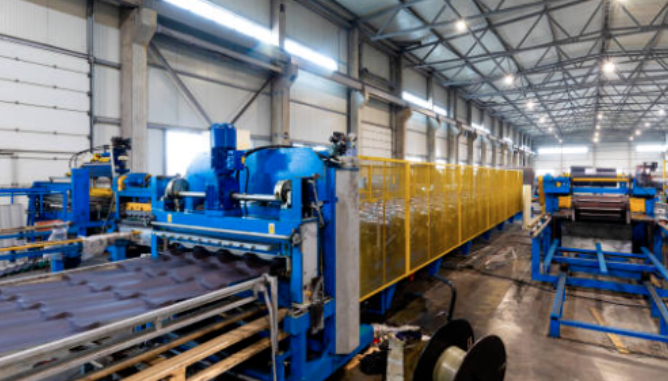1. Single-Level Roll Forming Machine
Pros:
- Simple design and operation
- Cost-effective for small-scale production
- Suitable for low to medium production volumes
- Quick setup for single profile
Cons:
- Limited to one profile at a time
- Requires tool changes for different profiles
- Not suitable for high-volume or complex projects
2. Double-Level Roll Forming Machine
Pros:
- Can form two profiles on a single machine
- Saves floor space compared to two separate machines
- Faster production switching between profiles
- Cost-effective for companies requiring two different profiles
Cons:
- Slightly more expensive than single-level machines
- More complex maintenance and setup
- Can’t run both levels simultaneously, so productivity per profile may be lower than dedicated machines
3. C-Z Purlin Roll Forming Machine
Pros:
- Automatic profile change between C and Z shapes
- High production efficiency
- Versatile for various building structures
- Adjustable for different sizes of purlins
Cons:
- Expensive initial investment
- Complex machinery may require experienced operators
- Maintenance can be challenging due to the adjustable features
4. Floor Deck Roll Forming Machine
Pros:
- Ideal for construction and infrastructure projects
- Creates strong and durable floor decking panels
- High-speed production capability
- Capable of producing large volumes in continuous runs
Cons:
- High capital cost
- Specific to floor decking, limiting flexibility
- Requires significant space for installation
5. Roof Panel Roll Forming Machine
Pros:
- Essential for roofing industries
- High output for continuous production
- Can produce various roofing profiles
- Highly durable and efficient production process
Cons:
- High initial investment
- Limited to specific roofing panel designs
- Requires maintenance for long-term durability
6. Downspout Roll Forming Machine
Pros:
- Specialized for downspouts, gutters, and rainwater systems
- Consistent quality and uniformity of output
- Efficient and quick production for large-scale projects
- Automated cutting and punching options
Cons:
- Not versatile; limited to producing downspouts and gutters
- Expensive, especially for smaller operations
- Requires a skilled workforce to maintain
7. Highway Guardrail Roll Forming Machine
Pros:
- Essential for producing guardrails for road safety
- Heavy-duty, suitable for large-scale infrastructure projects
- Can handle thicker metals and produce durable products
- High-speed production for mass requirements
Cons:
- High cost and large machine footprint
- Limited versatility; designed for guardrails only
- High maintenance requirements
8. Stud and Track Roll Forming Machine
Pros:
- Ideal for construction industries needing studs and tracks for framing
- Highly efficient for continuous production
- Low-cost operation after initial setup
- Versatile with adjustable sizes
Cons:
- Limited to specific construction materials
- High initial investment
- Setup time for different profiles can slow production
9. Ridge Cap Roll Forming Machine
Pros:
- Specialized for producing ridge caps for roofing systems
- Fast and efficient production
- High-quality, consistent output
- Requires less maintenance due to specialized design
Cons:
- Limited product variety; only makes ridge caps
- High upfront cost for a specialized machine
- Less flexible for other product types
10. Seamless Gutter Roll Forming Machine
Pros:
- Essential for gutter manufacturing industries
- Fast, continuous production
- Produces seamless gutters with reduced waste
- Customizable sizes and profiles
Cons:
- Limited to gutter production
- High machine cost, especially for automated versions
- Requires specialized operators for maintenance and setup
These pros and cons can help you assess which roll forming machine is best for a particular application based on production needs, versatility, and budget.




